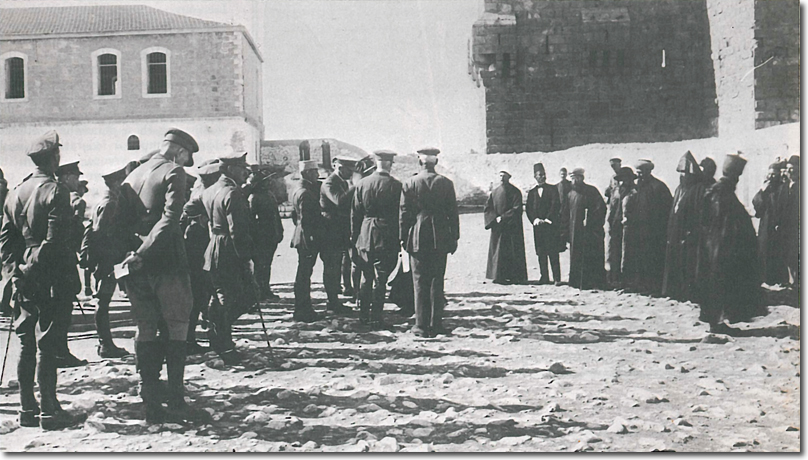|
|


|
|
During the First World War the Middle
East acquired a crucial significance: the
Kaiser dreamed of dominating the crescent
lands of the Levant, of slashing
Britain's imperial lifelines to East Africa
and India and of thus destroying Britain
as a great power. The Ottoman Empire,
whose domain then ran - in theory if not in
practice - from Constantinople to Egypt's
western border, was, after careful cultivation
as an ally, his natural instrument
against Britain. It fell to one of Britain's
greatest soldiers, General Edmund Allenby,
to thwart these grandiose plans. He
defeated the Turks in a dazzling campaign
in which he deceived them into
so dividing their forces as to transform
his own two-to-one superiority into a
preponderance of four-to-one.
Starting in the autumn of 1917, he led his troops - partly British and Empire, partly Arab northwards from Beersheba, then along the Mediterranean coast to the port of Jaffa, inland to Jerusalem and thence, keeping the enemy off-balance by a series of subtle feints, to Damascus, Beirut and Aleppo. Again and again, he tricked them into believing that he was concentrating his strength at one point, only to attack at another. He finally trapped them in the heart of Palestine. He had determined that no injury must befall Jerusalem, and he took the sacred city completely without resistance. Lawrence, who was with him when the city surrendered, said, "the campaign was perhaps the most scientifically perfect in English history," and that "the victory had been the logical fruit solely of (Allenby's) genius." Allenby, in his turn, praised Lawrence publicly, but he could never quite decide how much he was "genuine performer and how much charlatan." He once said of Lawrence to a brother-general, "He thinks himself a hell of a soldier, and loves posturing." As a reward for his Middle East victory, Allenby was promoted to field marshal. created Viscount Allenby of Megiddo and Felixstowe, and awarded a grant of £50,000. In 1919, he was made High Commissioner of Egypt. As a man, Allenby was a paradox. Straightforward almost to the point of rudeness, he was utterly military in his bearing, heavily built and powerful. To those he commanded, he was known as "the Bull," though his strategy combined the wiliness of the serpent with the sharp ferocity of the tiger. Despite his authoritative appearance and dominating intellectual brilliance, in his private life he was precisely the opposite: gentle and contemplative, he adored the English countryside, loved to garden and spent his last years fishing and bird-watching. |
Armed Forces | Art and Culture | Articles | Biographies | Colonies | Discussion | Glossary | Home | Library | Links | Map Room | Sources and Media | Science and Technology | Search | Student Zone | Timelines | TV & Film | Wargames